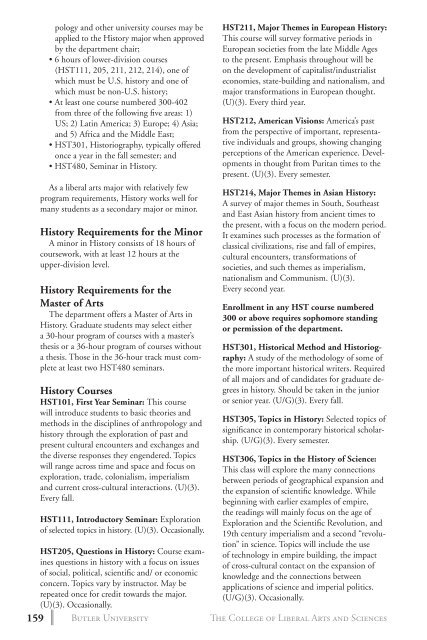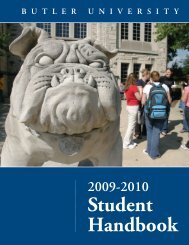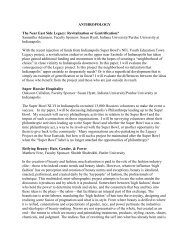2 0 1 3 bulletin - Butler University
2 0 1 3 bulletin - Butler University
2 0 1 3 bulletin - Butler University
Create successful ePaper yourself
Turn your PDF publications into a flip-book with our unique Google optimized e-Paper software.
pology and other university courses may be<br />
applied to the History major when approved<br />
by the department chair;<br />
• 6 hours of lower-division courses<br />
(HST111, 205, 211, 212, 214), one of<br />
which must be U.S. history and one of<br />
which must be non-U.S. history;<br />
• At least one course numbered 300-402<br />
from three of the following five areas: 1)<br />
US; 2) Latin America; 3) Europe; 4) Asia;<br />
and 5) Africa and the Middle East;<br />
• HST301, Historiography, typically offered<br />
once a year in the fall semester; and<br />
• HST480, Seminar in History.<br />
As a liberal arts major with relatively few<br />
program requirements, History works well for<br />
many students as a secondary major or minor.<br />
History Requirements for the Minor<br />
A minor in History consists of 18 hours of<br />
coursework, with at least 12 hours at the<br />
upper-division level.<br />
History Requirements for the<br />
Master of Arts<br />
The department offers a Master of Arts in<br />
History. Graduate students may select either<br />
a 30-hour program of courses with a master’s<br />
thesis or a 36-hour program of courses without<br />
a thesis. Those in the 36-hour track must complete<br />
at least two HST480 seminars.<br />
History Courses<br />
HST101, First Year Seminar: This course<br />
will introduce students to basic theories and<br />
methods in the disciplines of anthropology and<br />
history through the exploration of past and<br />
present cultural encounters and exchanges and<br />
the diverse responses they engendered. Topics<br />
will range across time and space and focus on<br />
exploration, trade, colonialism, imperialism<br />
and current cross-cultural interactions. (U)(3).<br />
Every fall.<br />
HST211, Major Themes in European History:<br />
This course will survey formative periods in<br />
European societies from the late Middle Ages<br />
to the present. Emphasis throughout will be<br />
on the development of capitalist/industrialist<br />
economies, state-building and nationalism, and<br />
major transformations in European thought.<br />
(U)(3). Every third year.<br />
HST212, American Visions: America’s past<br />
from the perspective of important, representative<br />
individuals and groups, showing changing<br />
perceptions of the American experience. Developments<br />
in thought from Puritan times to the<br />
present. (U)(3). Every semester.<br />
HST214, Major Themes in Asian History:<br />
A survey of major themes in South, Southeast<br />
and East Asian history from ancient times to<br />
the present, with a focus on the modern period.<br />
It examines such processes as the formation of<br />
classical civilizations, rise and fall of empires,<br />
cultural encounters, transformations of<br />
societies, and such themes as imperialism,<br />
nationalism and Communism. (U)(3).<br />
Every second year.<br />
Enrollment in any HST course numbered<br />
300 or above requires sophomore standing<br />
or permission of the department.<br />
HST301, Historical Method and Historiography:<br />
A study of the methodology of some of<br />
the more important historical writers. Required<br />
of all majors and of candidates for graduate degrees<br />
in history. Should be taken in the junior<br />
or senior year. (U/G)(3). Every fall.<br />
HST305, Topics in History: Selected topics of<br />
significance in contemporary historical scholarship.<br />
(U/G)(3). Every semester.<br />
HST306, Topics in the History of Science:<br />
This class will explore the many connections<br />
between periods of geographical expansion and<br />
the expansion of scientific knowledge. While<br />
beginning with earlier examples of empire,<br />
the readings will mainly focus on the age of<br />
HST111, Introductory Seminar: Exploration<br />
Exploration and the Scientific Revolution, and<br />
of selected topics in history. (U)(3). Occasionally. 19th century imperialism and a second “revolution”<br />
in science. Topics will include the use<br />
HST205, Questions in History: Course examines<br />
questions in history with a focus on issues of cross-cultural contact on the expansion of<br />
of technology in empire building, the impact<br />
of social, political, scientific and/ or economic<br />
knowledge and the connections between<br />
concern. Topics vary by instructor. May be<br />
applications of science and imperial politics.<br />
repeated once for credit towards the major.<br />
(U/G)(3). Occasionally.<br />
(U)(3). Occasionally.<br />
159 <strong>Butler</strong> <strong>University</strong><br />
The College of Liberal Arts and Sciences
















